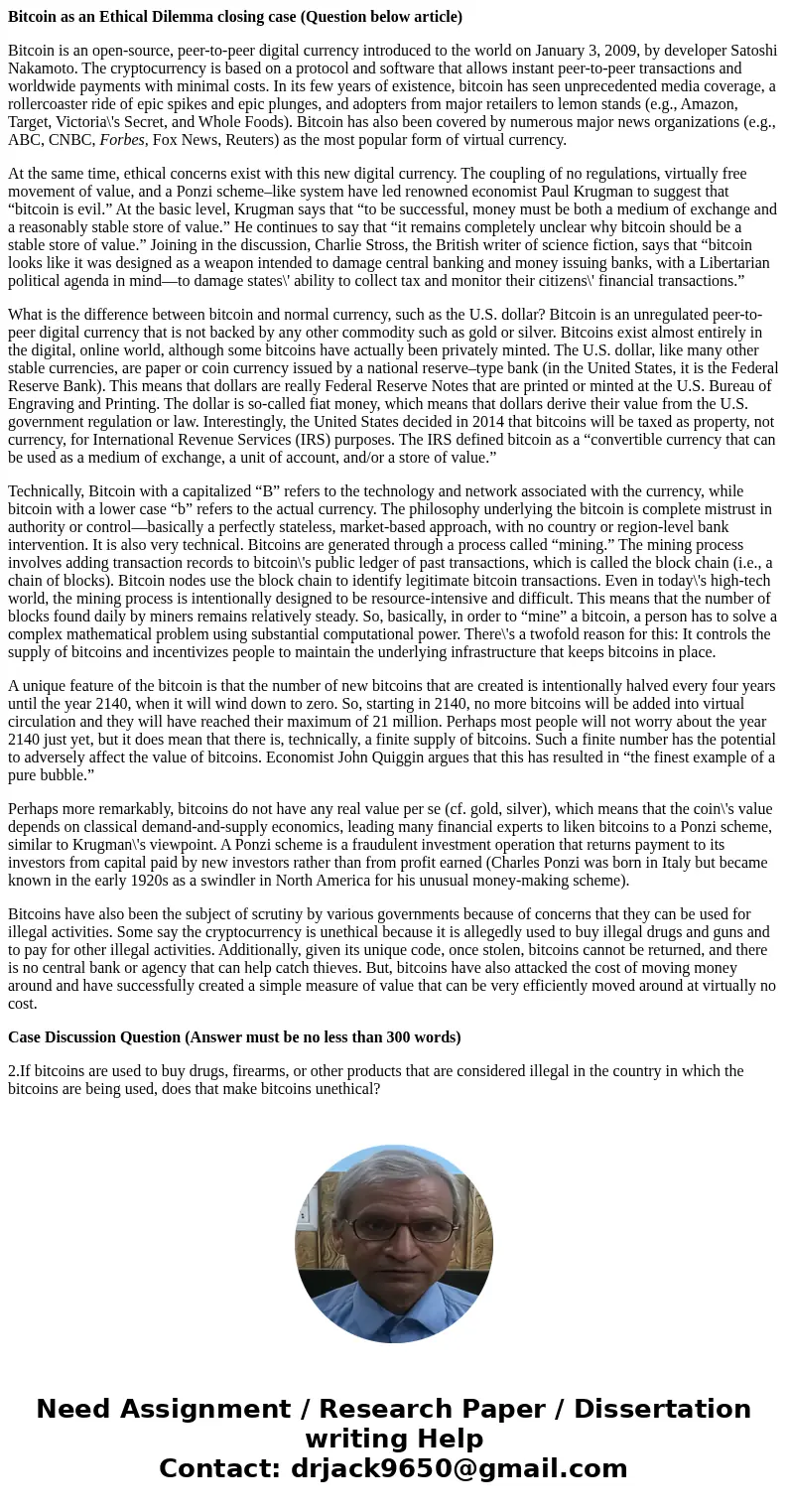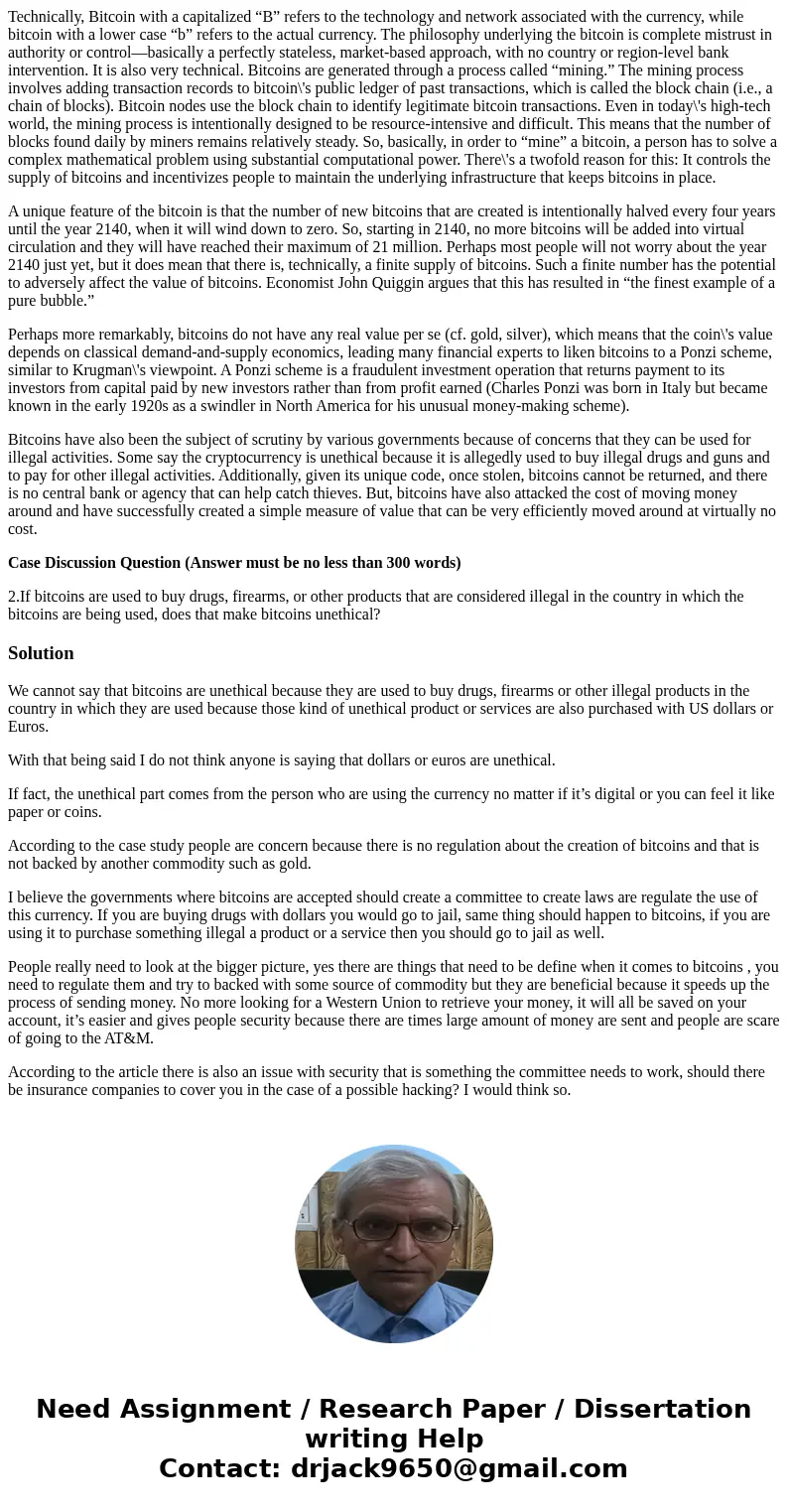Bitcoin as an Ethical Dilemma closing case Question below ar
Bitcoin as an Ethical Dilemma closing case (Question below article)
Bitcoin is an open-source, peer-to-peer digital currency introduced to the world on January 3, 2009, by developer Satoshi Nakamoto. The cryptocurrency is based on a protocol and software that allows instant peer-to-peer transactions and worldwide payments with minimal costs. In its few years of existence, bitcoin has seen unprecedented media coverage, a rollercoaster ride of epic spikes and epic plunges, and adopters from major retailers to lemon stands (e.g., Amazon, Target, Victoria\'s Secret, and Whole Foods). Bitcoin has also been covered by numerous major news organizations (e.g., ABC, CNBC, Forbes, Fox News, Reuters) as the most popular form of virtual currency.
At the same time, ethical concerns exist with this new digital currency. The coupling of no regulations, virtually free movement of value, and a Ponzi scheme–like system have led renowned economist Paul Krugman to suggest that “bitcoin is evil.” At the basic level, Krugman says that “to be successful, money must be both a medium of exchange and a reasonably stable store of value.” He continues to say that “it remains completely unclear why bitcoin should be a stable store of value.” Joining in the discussion, Charlie Stross, the British writer of science fiction, says that “bitcoin looks like it was designed as a weapon intended to damage central banking and money issuing banks, with a Libertarian political agenda in mind—to damage states\' ability to collect tax and monitor their citizens\' financial transactions.”
What is the difference between bitcoin and normal currency, such as the U.S. dollar? Bitcoin is an unregulated peer-to-peer digital currency that is not backed by any other commodity such as gold or silver. Bitcoins exist almost entirely in the digital, online world, although some bitcoins have actually been privately minted. The U.S. dollar, like many other stable currencies, are paper or coin currency issued by a national reserve–type bank (in the United States, it is the Federal Reserve Bank). This means that dollars are really Federal Reserve Notes that are printed or minted at the U.S. Bureau of Engraving and Printing. The dollar is so-called fiat money, which means that dollars derive their value from the U.S. government regulation or law. Interestingly, the United States decided in 2014 that bitcoins will be taxed as property, not currency, for International Revenue Services (IRS) purposes. The IRS defined bitcoin as a “convertible currency that can be used as a medium of exchange, a unit of account, and/or a store of value.”
Technically, Bitcoin with a capitalized “B” refers to the technology and network associated with the currency, while bitcoin with a lower case “b” refers to the actual currency. The philosophy underlying the bitcoin is complete mistrust in authority or control—basically a perfectly stateless, market-based approach, with no country or region-level bank intervention. It is also very technical. Bitcoins are generated through a process called “mining.” The mining process involves adding transaction records to bitcoin\'s public ledger of past transactions, which is called the block chain (i.e., a chain of blocks). Bitcoin nodes use the block chain to identify legitimate bitcoin transactions. Even in today\'s high-tech world, the mining process is intentionally designed to be resource-intensive and difficult. This means that the number of blocks found daily by miners remains relatively steady. So, basically, in order to “mine” a bitcoin, a person has to solve a complex mathematical problem using substantial computational power. There\'s a twofold reason for this: It controls the supply of bitcoins and incentivizes people to maintain the underlying infrastructure that keeps bitcoins in place.
A unique feature of the bitcoin is that the number of new bitcoins that are created is intentionally halved every four years until the year 2140, when it will wind down to zero. So, starting in 2140, no more bitcoins will be added into virtual circulation and they will have reached their maximum of 21 million. Perhaps most people will not worry about the year 2140 just yet, but it does mean that there is, technically, a finite supply of bitcoins. Such a finite number has the potential to adversely affect the value of bitcoins. Economist John Quiggin argues that this has resulted in “the finest example of a pure bubble.”
Perhaps more remarkably, bitcoins do not have any real value per se (cf. gold, silver), which means that the coin\'s value depends on classical demand-and-supply economics, leading many financial experts to liken bitcoins to a Ponzi scheme, similar to Krugman\'s viewpoint. A Ponzi scheme is a fraudulent investment operation that returns payment to its investors from capital paid by new investors rather than from profit earned (Charles Ponzi was born in Italy but became known in the early 1920s as a swindler in North America for his unusual money-making scheme).
Bitcoins have also been the subject of scrutiny by various governments because of concerns that they can be used for illegal activities. Some say the cryptocurrency is unethical because it is allegedly used to buy illegal drugs and guns and to pay for other illegal activities. Additionally, given its unique code, once stolen, bitcoins cannot be returned, and there is no central bank or agency that can help catch thieves. But, bitcoins have also attacked the cost of moving money around and have successfully created a simple measure of value that can be very efficiently moved around at virtually no cost.
Case Discussion Question (Answer must be no less than 300 words)
2.If bitcoins are used to buy drugs, firearms, or other products that are considered illegal in the country in which the bitcoins are being used, does that make bitcoins unethical?
Solution
We cannot say that bitcoins are unethical because they are used to buy drugs, firearms or other illegal products in the country in which they are used because those kind of unethical product or services are also purchased with US dollars or Euros.
With that being said I do not think anyone is saying that dollars or euros are unethical.
If fact, the unethical part comes from the person who are using the currency no matter if it’s digital or you can feel it like paper or coins.
According to the case study people are concern because there is no regulation about the creation of bitcoins and that is not backed by another commodity such as gold.
I believe the governments where bitcoins are accepted should create a committee to create laws are regulate the use of this currency. If you are buying drugs with dollars you would go to jail, same thing should happen to bitcoins, if you are using it to purchase something illegal a product or a service then you should go to jail as well.
People really need to look at the bigger picture, yes there are things that need to be define when it comes to bitcoins , you need to regulate them and try to backed with some source of commodity but they are beneficial because it speeds up the process of sending money. No more looking for a Western Union to retrieve your money, it will all be saved on your account, it’s easier and gives people security because there are times large amount of money are sent and people are scare of going to the AT&M.
According to the article there is also an issue with security that is something the committee needs to work, should there be insurance companies to cover you in the case of a possible hacking? I would think so.


 Homework Sourse
Homework Sourse